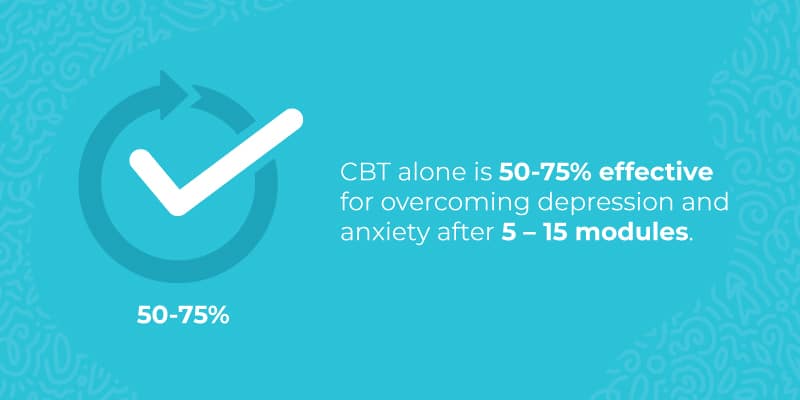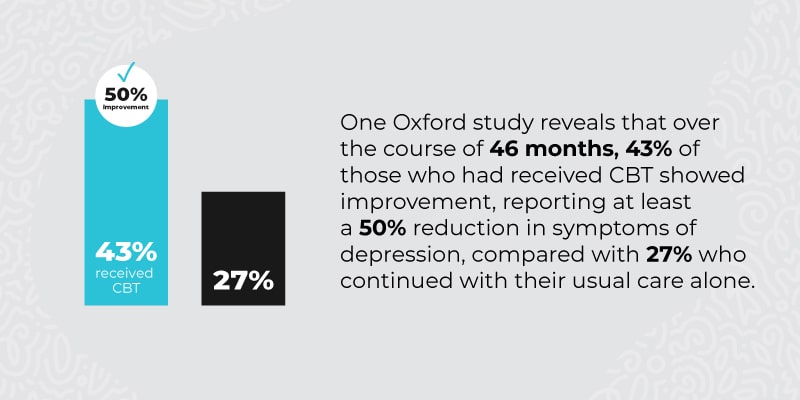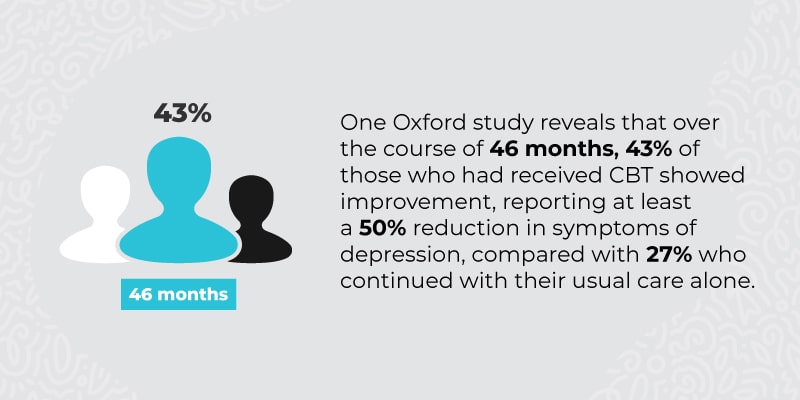Reclaim Your Life With Cognitive Behavioral Therapy (CBT)
What Is Cognitive Behavioral Therapy and How Does it Work?
Cognitive behavioral therapy (CBT) is a type of talk therapy. It is based on the idea that our thoughts, feelings, and behaviors are all interconnected.
The goal of CBT is to help individuals identify and change negative or distorted thinking patterns and behaviors.
These patterns are thought to contribute to mental health issues or emotional distress.1

CBT Techniques
CBT works by helping individuals learn to recognize and challenge their negative or irrational thoughts and beliefs and then replace them with more positive and helpful ones.
This is done through various techniques, such as:2
- Cognitive restructuring, or changing thinking patterns
- Behavioral experiments
- Exposure therapy
Reclaiming Your Life With CBT at Vista Taos
What Happens During Sessions?
During CBT sessions, individuals work with a therapist to identify negative patterns and replace them with more positive and realistic ones.
They may also be encouraged to engage in behavioral experiments. This involves testing out new behaviors or ways of thinking to see how they affect mood and well-being.
Exposure therapy is another common technique used in CBT. It involves gradually exposing individuals to the situations or stimuli that trigger their anxiety or fear. This is done to help them learn to cope with and overcome their anxiety.3
An Overview of CBT
The History of CBT
Cognitive behavioral therapy was developed in the 1960s by psychiatrist Aaron Beck and psychologist Albert Ellis. Beck had originally trained in psychoanalysis, but became frustrated with what he saw as the limitations of this approach – especially its focus on past experiences and unconscious conflicts.
Beck began to develop an alternative approach that focused on the present and the individual’s current thoughts and beliefs. He believed that many mental health problems were caused by negative and distorted thinking patterns, which he called “cognitive distortions.”4
What Else to Know About CBT
Ellis had independently developed a similar approach, called “rational emotive behavior therapy” (REBT). Like Beck, Ellis believed that negative and irrational beliefs were at the root of many emotional and behavioral problems.5
Over time, Beck and Ellis’s approaches merged into what we now know as cognitive behavioral therapy. Since its development, CBT has become one of the most widely used and extensively researched forms of psychotherapy.
"At Vista Taos, we utilize various methods to measure progress and success in patients undergoing cognitive-behavioral therapy (CBT) for addiction. We regularly assess changes in substance use patterns, cravings, and coping skills through self-report measures and objective observations. Additionally, we track improvements in mood, motivation, and interpersonal functioning to gauge the broader impact of CBT on patients' lives. Collaboratively setting goals with patients allows us to monitor their achievements and tailor treatment accordingly. Ultimately, success in CBT for addiction is measured by the individual's ability to maintain sobriety, enhance resilience, and improve overall well-being."

The Principles of Cognitive Behavioral Therapy
The key principles of CBT are that:
- Thoughts, feelings, and behaviors are interconnected: CBT is based on the idea that our thoughts and beliefs can influence our emotions and behaviors, and vice versa.
- Negative and distorted thinking can lead to emotional distress: CBT proposes that negative and distorted thinking patterns can contribute to emotional distress and mental health problems.
- Changing thoughts can lead to behavioral change: CBT emphasizes the importance of identifying and changing negative or irrational thoughts and beliefs. This can lead to changes in behavior and a reduction in symptoms.
- Therapy is collaborative and goal-oriented: The therapist and the individual work together to identify specific goals for therapy. And develop a treatment plan to achieve those goals.
- Therapy is present-focused: While past experiences and traumas may be discussed in therapy, the focus of CBT is on the present. This includes how individuals can change their thoughts and behaviors to improve their current situation.
- Skills and strategies are learned and practiced: CBT involves learning new skills and strategies. These skills are then practiced outside of therapy to reinforce learning and promote lasting change.
By helping you identify and change negative thinking patterns and behaviors, CBT can help you improve mood and reduce anxiety or stress.
How Is Cognitive Behavioral Therapy Used in Addiction Treatment?
According to the Association of American Medical Colleges, almost 21 million Americans struggle with addiction, yet only 10% of them receive treatment.6
Cognitive behavioral therapy is often used in addiction treatment. It helps individuals identify and change the thoughts, feelings, and behaviors that may be contributing to their substance abuse.
Individuals also learn coping strategies and problem-solving skills to help deal with these risks and manage cravings.
How Else Is CBT Used For Treatment?
CBT for addiction also involves learning new, healthier ways of thinking about oneself and the world. For example, individuals may be encouraged to engage in physical exercise or pursue hobbies that provide a sense of purpose and fulfillment.
CBT has been found to be effective in reducing substance use and preventing relapse. For example, in a study of treatment for cocaine dependence, it was reported that 60% of patients who were taught CBT provided clean drug screens after a year.7
Another study suggested that 79% of individuals treated with CBT showed rates of substance-use-reduction above the average of those assigned to a wait-list or a no-treatment group.8
What to Expect During Cognitive Behavioral Therapy
CBT often involves a collaborative approach between the therapist and the client. Here’s an idea of what you can expect during CBT:
Assessment
At the beginning of therapy, the therapist will often conduct an assessment. This is to gather information about your symptoms, history, and current situation.
This may involve asking questions about your thoughts, feelings, and behaviors. It may also include any past experiences or trauma that may be relevant to your current difficulties.
Goal Setting
Once the assessment is complete, you will work with the therapist to identify specific goals for therapy.
These goals may include:
- Reducing symptoms of anxiety or depression
- Improving self-esteem
- Changing patterns of behavior that may be contributing to difficulties
Behavioral Experiments
Another technique used in CBT is behavioral experiments. This involves testing out new behaviors or ways of thinking to see how they affect mood and well-being.
The therapist may encourage you to engage in activities that you have been avoiding or to approach situations that you find challenging to build confidence and develop new skills.
Homework
Between sessions, you may be given homework assignments. This could include keeping a thought diary or practicing relaxation techniques.
These assignments are designed to reinforce the skills and strategies learned in therapy and help you make progress towards goals.
Review and Feedback
Throughout therapy, you and your therapist will regularly review progress towards goals and discuss any challenges or obstacles that arise. The therapist may also provide feedback and support to help you continue to make progress.
Treatment Duration
The duration of cognitive behavioral therapy can vary depending on your needs. It can also depend on the nature and severity of the problem being addressed. However, most treatment programs are a few months long.
The length of treatment may be longer or shorter depending on various factors.
This might include:
- The complexity of the problem
- You motivation and commitment to therapy
- The level of progress made in achieving treatment goals
The duration of CBT will depend on your unique circumstances and treatment goals. It will be determined in collaboration with the therapist.
How Does CBT Compare to Other Treatment Options?
CBT, dialectical behavior therapy (DBT), motivational interviewing (MI), and acceptance and commitment therapy (ACT) are all evidence-based psychotherapies. They are used to treat a wide range of mental health conditions.
While each of these therapies has its own unique approach and techniques, they share some similarities and differences.
CBT vs. DBT
DBT is a form of cognitive behavioral therapy. It was originally developed to treat borderline personality disorder.
DBT emphasizes the importance of:
- Mindfulness
- Distress tolerance
- Emotion regulation
- Interpersonal effectiveness
It is often used to treat conditions such as eating disorders, substance use disorders, and PTSD.
A Closer Look at DBT
CBT vs. Experiential Therapy
CBT focuses on the “thinking-feeling-doing” connection, examining thought patterns that drive emotions and behaviors. It equips you with practical tools like cognitive restructuring and behavioral activation to modify unhelpful thinking and behaviors.
On the other hand, experiential therapy prioritizes direct experience and emotional processing. Instead of solely analyzing thoughts, you actively engage in exercises like role-playing or mindfulness practices to directly confront emotional wounds, explore relationships, and gain self-awareness.
It’s less structured, encouraging spontaneity and creativity. This allows you to “relive” and work through past experiences to achieve growth and change.
"Experiential therapy differs from traditional talk therapy approaches by emphasizing active participation and engaging individuals in hands-on experiences rather than solely relying on verbal communication. It incorporates creative and expressive techniques, such as art, role-playing, and physical activities, to facilitate exploration and emotional processing. This approach allows for a deeper level of self-discovery, experiential learning, and integration of emotions and experiences beyond verbal expression alone."
CBT vs. MI
Motivational interviewing is a client-centered therapy. It aims to help individuals identify and resolve ambivalence about change. MI is often used in addiction treatment, where it can help individuals overcome resistance to change and increase their motivation to engage in treatment.
"Motivational interviewing assists individuals in addressing substance abuse issues by providing a collaborative and person-centered approach to change. It helps individuals explore and resolve ambivalence towards their substance use, while simultaneously enhancing their motivation and commitment to positive change. By fostering a non-confrontational and empathetic therapeutic relationship, motivational interviewing helps individuals identify their own values, goals, and reasons for change, ultimately supporting them in making informed decisions and taking steps towards recovery."
CBT vs. ACT
Acceptance and commitment therapy is a mindfulness-based therapy. It emphasizes the importance of accepting difficult thoughts and feelings while taking action based on personal values.
ACT is often used to treat conditions such as anxiety, depression, and chronic pain. It can be particularly helpful for individuals who struggle with emotional avoidance.
While each of these therapies has its own unique approach and techniques, they all share a common goal of promoting positive change and improving mental health. The choice of therapy will depend on your unique needs and goals.
A Closer Look at ACT
CBT vs. Psychodrama Therapy
"Psychodrama therapy helps individuals explore and resolve unresolved issues by providing a dynamic and experiential approach to therapy. Through role-playing, action methods, and group interaction, psychodrama allows individuals to engage in a therapeutic enactment of their experiences, gaining insight, emotional release, and new perspectives. This therapeutic modality promotes self-expression, catharsis, and the exploration of different roles and scenarios, fostering healing and growth in the process."

Pros and Cons of Cognitive Behavioral Therapy
Like any form of therapy, cognitive behavioral therapy has its advantages and disadvantages.
Here are some of the pros and cons of CBT:
Pros
Some common benefits of cognitive behavioral therapy include:
- CBT is a well-established and extensively researched form of psychotherapy
- CBT can help individuals achieve measurable and sustainable improvements in their mental health
- CBT emphasizes the development of practical skills and strategies that can be applied in everyday life
- CBT is a collaborative therapy. This means the therapist and the individual work together to identify specific goals for therapy and develop a treatment plan to achieve those goals
- CBT can be tailored to meet the individual needs and goals of each patient
Cons
However, some of the cons to take note of for cognitive behavioral therapy include:
- While CBT can help individuals develop practical skills and strategies to manage symptoms, it may not address deeper-rooted issues or past traumas that may be contributing to their difficulties
- CBT may not work for everyone. Some individuals may require alternative forms of treatment or a combination of therapies
- CBT can be uncomfortable or emotionally difficult for some individuals
- CBT primarily focuses on thoughts, feelings, and behaviors. It may not address other important aspects of the individual, such as their relationships, culture, or spirituality
Make sure you meet with your doctor to make sure that this treatment option is best for you.

Tips for Getting the Most Out of Cognitive Behavioral Therapy
It takes work to get the most out of therapy. Here are five tips on how to get the most out of cognitive behavioral therapy:
Be Open and Honest
Be open and honest about your thoughts, feelings, and experiences, even if they are difficult to talk about.
Set Specific Goals
Identify specific goals for therapy. Work with your therapist to develop a plan to achieve those goals. Setting clear and measurable objectives can help you stay motivated and track your progress.
Practice Skills and Strategies Between Sessions
Cognitive behavioral therapy involves learning new skills and strategies. It’s important to practice these skills outside of therapy to reinforce learning and promote lasting change.
Be willing to try out new behaviors and ways of thinking in your daily life.
Be Patient and Persistent
Change takes time. Progress in therapy may not always be a straight line. Be patient with yourself and the process. Don’t give up if you don’t see immediate results.
Be an Active Participant
Cognitive behavioral therapy requires active participation and engagement from the individual. You will get the most out of therapy if you are willing to take an active role in the process.
Ask questions, provide feedback, and be willing to try out new techniques and strategies.
Attend All Sessions
Try to attend all scheduled therapy sessions. Make sure to let your therapist know in advance if you need to reschedule or cancel.
Consistent attendance can help you stay on track with your goals and make the most of your time in therapy.
Be Open to Feedback
Your therapist may provide feedback and challenge negative or distorted thinking patterns. Be open to this feedback, and try to approach it with a spirit of curiosity and learning.
Keep a Thought Diary
Keeping a thought diary can help you identify patterns of negative thinking and track progress over time.
Write down any negative thoughts or beliefs that come up, and work with your therapist to challenge and reframe them.
Take Care of Yourself
Self-care is an important part of the therapy process. Make sure to take care of your physical and emotional needs. Practice healthy habits such as exercise, healthy eating, and getting enough rest.
Stay Engaged and Motivated
It’s important to stay engaged and motivated throughout the therapy process. Set small goals for yourself, celebrate successes, and remember why you started therapy in the first place.
Is Cognitive Behavioral Therapy Right for You?
CBT is an effective treatment for a wide range of mental health conditions. However, it may not be the right choice for everyone.
Here are some factors to consider when deciding if CBT is right for you:
Your Specific Mental Health Condition
CBT has been found to be effective for many mental health conditions. Consider your concerns and issues.
Cognitive behavioral therapy may be a good treatment option for you if:
- You want to focus on current issues
- You’re looking to change your negative thought and behavior patterns
- You’re open to practicing new strategies for behavior changes
Your Treatment Goals
CBT is a goal-oriented therapy. It may be particularly helpful if you have specific goals in mind for therapy.
This could include:
- Reducing symptoms of a condition like anxiety or depression
- Improving coping skills
- Addressing problematic behaviors
Your Preferred Therapy Style
Cognitive behavioral therapy is a structured and directive therapy. This may appeal to individuals who prefer a more focused and solution-oriented approach to therapy.
However, if you prefer a more exploratory or open-ended therapy style, CBT may not be the best fit for you.
Your Willingness to Take Part in Therapy
Cognitive behavioral therapy requires active participation and engagement from the individual. It often involves homework assignments and practicing exercises between sessions. If you are willing and able to take part in therapy, CBT may be a good fit for you.
Your Willingness to Challenge Negative Thoughts and Beliefs
CBT involves identifying and challenging negative thoughts and beliefs that may be contributing to mental health problems. If you are willing and able to work on changing these patterns of thinking, CBT may be an effective treatment option for you.
Ultimately, the decision to pursue CBT or any other form of therapy should be made in consultation with a mental health professional. Someone can help you assess your needs and determine the best course of treatment for you.

How Can Vista Taos Renewal Center Help in Addiction Recovery?
Vista Taos Renewal Center is a residential treatment center that specializes in helping individuals recover from addiction and co-occurring mental health conditions.
Our comprehensive and holistic approach uses your strengths to set and achieve goals for recovery.
Vista Taos Holistic Treatment Opportunities
In addition to traditional therapy modalities like CBT, we offer experiential therapies such as:
- Nutritional support
- Art therapy
- Massage
- Yoga
- Mindfulness meditation
- Recreational therapy
We will work with you to create an individualized treatment plan that will address all of your specific needs. Our supportive staff will be with you every step of the way.
"Nutrition counseling plays a vital role in promoting overall health and well-being by providing individuals with personalized guidance and education on proper nutrition and dietary habits. It helps individuals develop a deeper understanding of the connection between their food choices and their physical and mental health. By addressing nutritional needs, supporting healthy eating habits, and addressing specific concerns or conditions, nutrition counseling can contribute to improved energy levels, weight management, disease prevention, and enhanced overall quality of life."
Get in Touch With Us Today
The combination of traditional and holistic techniques helps promote physical and emotional healing. The nurturing and supportive environment at Vista Taos Renewal Center promotes recovery.
Our aftercare planning and support is provided to help you maintain your recovery after leaving treatment. Get cognitive behavioral therapy with Vista Taos Renewal Center by contacting us today.
Resources
- https://www.mayoclinic.org/tests-procedures/cognitive-behavioral-therapy/about/pac-20384610
- https://www.medicalnewstoday.com/articles/cognitive-restructuring
- https://www.apa.org/ptsd-guideline/patients-and-families/exposure-therapy
- https://www.ncbi.nlm.nih.gov/books/NBK470241/
- https://www.medicalnewstoday.com/articles/rational-emotive-behavioural-therapy
- https://www.aamc.org/news/21-million-americans-suffer-addiction-just-3000-physicians-are-specially-trained-treat-them
- https://pubmed.ncbi.nlm.nih.gov/12215081/
- https://www.ncbi.nlm.nih.gov/pmc/articles/PMC2696292/




